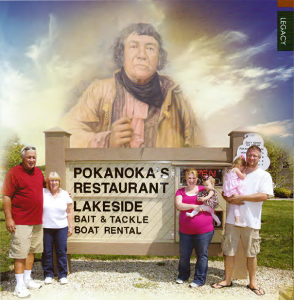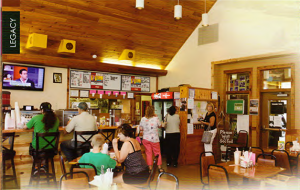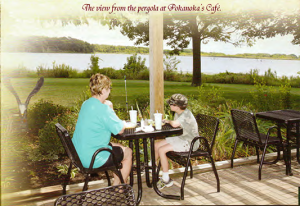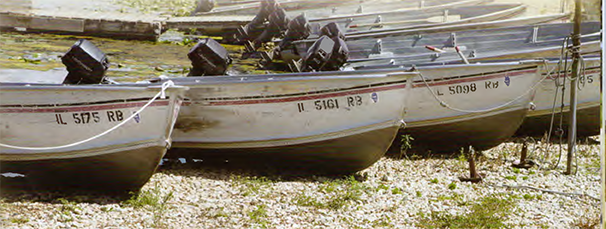Resource Bank recently featured Denny, Kathy, Clint and Heather Sands in their “Your Resource For Living” Magazine.
The Sands of Lake Shabbona: Their love for the past and drive for success paint a bright future for one of DeKalb County’s natural treasures.
PDF version: http://ow.ly/esbXa
Lake Shabbona State Park, which is named in honor of the Potawatomi leader Chief Shabbona, includes 1,550 acres of land and over six miles of shoreline. The park is also home to a cafe, camping store, bait and tackle shop, and boat rental.
These businesses are owned and operated by the Sands family. Clint Sands and his wife, Heather, along with Clint’s father, Denny, and mother, Kathy, manage the day-to-day operations of the Shabbona complex. Becky Wardlow, Clint’s sister, designed and manages the company website and is the family’s public relations expert. Brother Aaron, a professional fishing guide, works weekends at the lake and puts on fishing seminars that draw hundreds of new visitors to the lake every year. In addition, a third generation, represented by Denny and Kathy’s grandsons, Christian and Anthony Deutsch, is now working in the family business.
The Sands family’s involvement with the businesses at Lake Shabbona began about 15 years ago, when Denny and his longtime friends, Gary Berg, brought the concession lease for the park’s cafe. Though Gary Berg retired two years ago, he and Denny were business partners for 13 years.
The men grew up together in Shabbona and lived a block away from one another. “Gary and I have been friend since either of us can remember. We wouldn’t have a successful business today if it wasn’t for him”, says Denny.
Back then, the cafe was called the Three Fires Restaurant. It wasn’t until Denny and Gary took it over that it became known as Pokanoka’s Cafe, renamed in honor of Chief Shabbona’s wife.
 About two years ago, Clint and Heather took over the businesses at Lake Shabbona and made some exciting changes, including bringing back the Friday Night Fish Fry and obtaining a liquor license for the cafe. Clint also made some cosmetic changes to the interior, redesigned the counter and installing flat screen TVs. “He really spruced the place up,” says Denny.
About two years ago, Clint and Heather took over the businesses at Lake Shabbona and made some exciting changes, including bringing back the Friday Night Fish Fry and obtaining a liquor license for the cafe. Clint also made some cosmetic changes to the interior, redesigned the counter and installing flat screen TVs. “He really spruced the place up,” says Denny.
Clint and Heather are making an effort to stage more family events at the lake, too, like customer appreciation days, fall movie nights, and ice skating in the winter. “We had a pig roast for customer appreciation day, and it was free for the first 100 customers. Now, we’re doing the movie night, which will take place on Labor Day weekend. It will be free. It’s just a good way to get families outside,” says Clint.
“This winter we’re open for ice fishing and will add an ice skating rink near the cafe pergola, along with fire pit and a little bench area,” Denny adds. “Over the years, the park has been primarily dedicated to fishing. We’re trying to reach out to more people with these family events to get the local people to use the park. It’s their park, they should use it.”
Clint also has plans for the campground at Lake Shabbona. “We want to expand it and add more activities, and we want to move the camping store to a more central location.” Clint hopes these changes will make camping at Lake Sahbbona more appealing.
Managing the concessions at the park is no small undertaking. “It’s actually three businesses in one,” says Denny. “The restaurant employs about 15 people, the bait shop employs another ten, and the camping store employes another four or five. So, over the summer, we’ve probably got about 25 people working for us. They’re all part-time employees. It’s great for the high school kids.”
 “Most of them start when they’re 14, and they stay with us for a while,” says Kathy.
“Most of them start when they’re 14, and they stay with us for a while,” says Kathy.
Denny adds, “They become part of the family. We adopt them all.”
Heather Sands actually did become a family member. She met Clint while she was a teenager, working at Pokanoka’s Cafe. “I was 14 when I first started here,” says Heather, whose mother and sister were also employed by the Sands family at one time.
Long before Denny became the owner and manager of the businesses at Lake Sahbbona, he played a key role in the park’s preservation during troubled times. “I grew up in Shabbona, and when the park opened up in 1978, I came out her fishing all the time. In 1982, the state was in a bad financial crisis, and they were going to close down all the parks in Illinois, including Shabbona Lake State Park. The Park Superintendent, Jim Sandine, asked me to help form a sportsman’s club to keep the park going. We started the Shabbona Lake Sportsman Club in 1982, and we did whatever we needed to do to keep the park open,” says Denny.
The Shabbona Lake Sportsman Club was also behind efforts to restock the fish population at the park, which included the building of rearing ponds. “A lot of their programs were copied by other sportsman’s clubs throughout the state,” says Kathy.
Today, the club plays a large part in the lake’s continuing reputation as an excellent fishing destination.
“It’s definitely the best lake in Illinois for fishing, thanks to their stocking efforts. There’s every specie in the lake you can think of, and they’re all big,” says Clint.
And it seems that the fish may not be the only big catch in the lake. According to Denny, there is rumored to be $80,000 worth of silver buried beneath the lake bottom.
“Back in 1965, there was silver heist in Chicago. The bad guys put the silver on a truck headed out towards Iowa on US 30. They were just outside Shabbona when the truck broke down. They didn’t want to leave the silver on their truck when they called the tow truck, so they unloaded the silver and buried it by a bend in the creek, so they could find it again later. The towing guys hauled the truck into Shabbona and repaired it without realizing whose truck it was. But the FBI was alerted that the truck had been seen in Shabbona. They caught the bad guys, but the crooks wouldn’t say where they buried the silver. The story is that they planned to do their time and come back to get the silver later. Little did they know that while they were doing their ten years, their silver was going under 30 feet of water. Nobody had gone looking for it that I know of, but the boaters checks their anchors when they bring them up!” says Denny.
Thanks to the Sands family, some of the park’s treasures are more accessible than the rumored stash of silver. In Pokanoka’s Cafe they have on display a wealth of Native American artifacts, such as arrowheads and axe heads, as well as historic portraits and photographs, including the known photograph of Chief Shabbona’s wife, which the Sands family obtained from the Chicago Historical Society. The most impressive item, as well as a personal favorite of the Sands family, is the 1899 chalk drawing of Chief Shabbona. “It hangs over the fireplace in the cafe. It’s one of a king. It’s got the original frame, gold with native grasses and ferns from Illinois,” says Kathy.
The chalk drawing of Chief Shabbona has an interesting history. Back in the 19th century, a family by the name of the Hollenbeck had been rescued by Chief Shabbona when he alerted them to an impending raid on their farm by Chief Blackhawk, allowing them to escape. The portrait was done from a photograph, many decades after Shabbona’ death, to commemorate his act of kindness to the family.
 “When we bought the cafe,” Denny recalls, “I was still working at the DeKalb County Sheriff’s Department. There was a young lady working at the jail who told me that when she was a kid her parents used to play cards with the Hollenbeck family. She said that in the study at the Hollenbeck’s place there was this larger-than-life portrait of Chief Shabbona. The kids were always afraid to go into that room, because the picture was so intimidating!
“When we bought the cafe,” Denny recalls, “I was still working at the DeKalb County Sheriff’s Department. There was a young lady working at the jail who told me that when she was a kid her parents used to play cards with the Hollenbeck family. She said that in the study at the Hollenbeck’s place there was this larger-than-life portrait of Chief Shabbona. The kids were always afraid to go into that room, because the picture was so intimidating!
“I asked her if she knew where the picture was now, and she said she didn’t, but the Hollenbeck family would. I traced the portrait to one of the Hollenbeck descendents, George Hollenbeck. I called him, told him who I was, and asked if it might be possible for us to display the portrait in the building here. Long story short, he said he’d love for us to display it in the restaurant. I asked him if he wanted us to sign something, and he said, “Let’s just shake on it.”
“And we’ve had it for 15 years,” adds Kathy.
The members of the Sands family are closely connected to the history of the park. Denny’s relatives on his mother’s side were among the first settlers in the Seneca area and they personally knew and were friends with Chief Shabbona. He would come to their cabin and eat corn mush and freshly baked bread.
They maintain this connection not only by sharing their knowledge of the past, but through an ongoing relationship with the descendents of Chief Shabbona and other members of the Potawatomi Nation. “The first year we were here, we had a visit from Chief Shabbona’s great-great-granddaughters. They were 88 and 90 years old! We have a picture of them with Chief Shabbona’s portrait. They were just tickled. And we had a direct descendent of Chief Shabbona come here last week with his wife. The Potwatomi we’ve met are honored that Shabbona Lake State Park exists.”
Lifestyle and livelihood are clearly intertwined for the Sands family. Their hearts seem to be in everything they do at Lake Shabbona, from running their businesses to making sure the brilliant history of Lake Shabbona never fades.
Denny Sands on Banking with Resource:
 “Back in 1998, when we took over the cafe and the rest of the businesses at Lake Shabbona, we needed financing, and I really didn’t have a whole lot of business experience. We knew Gus Grabbe of Resource Bank, and he knew us. Gus really got excited about the project. He helped talk me into doing it. He was my right hand guy to get everything going. We’ve been with Resource Bank since day one. So a big thank you goes out to Resource Bank.”
“Back in 1998, when we took over the cafe and the rest of the businesses at Lake Shabbona, we needed financing, and I really didn’t have a whole lot of business experience. We knew Gus Grabbe of Resource Bank, and he knew us. Gus really got excited about the project. He helped talk me into doing it. He was my right hand guy to get everything going. We’ve been with Resource Bank since day one. So a big thank you goes out to Resource Bank.”

